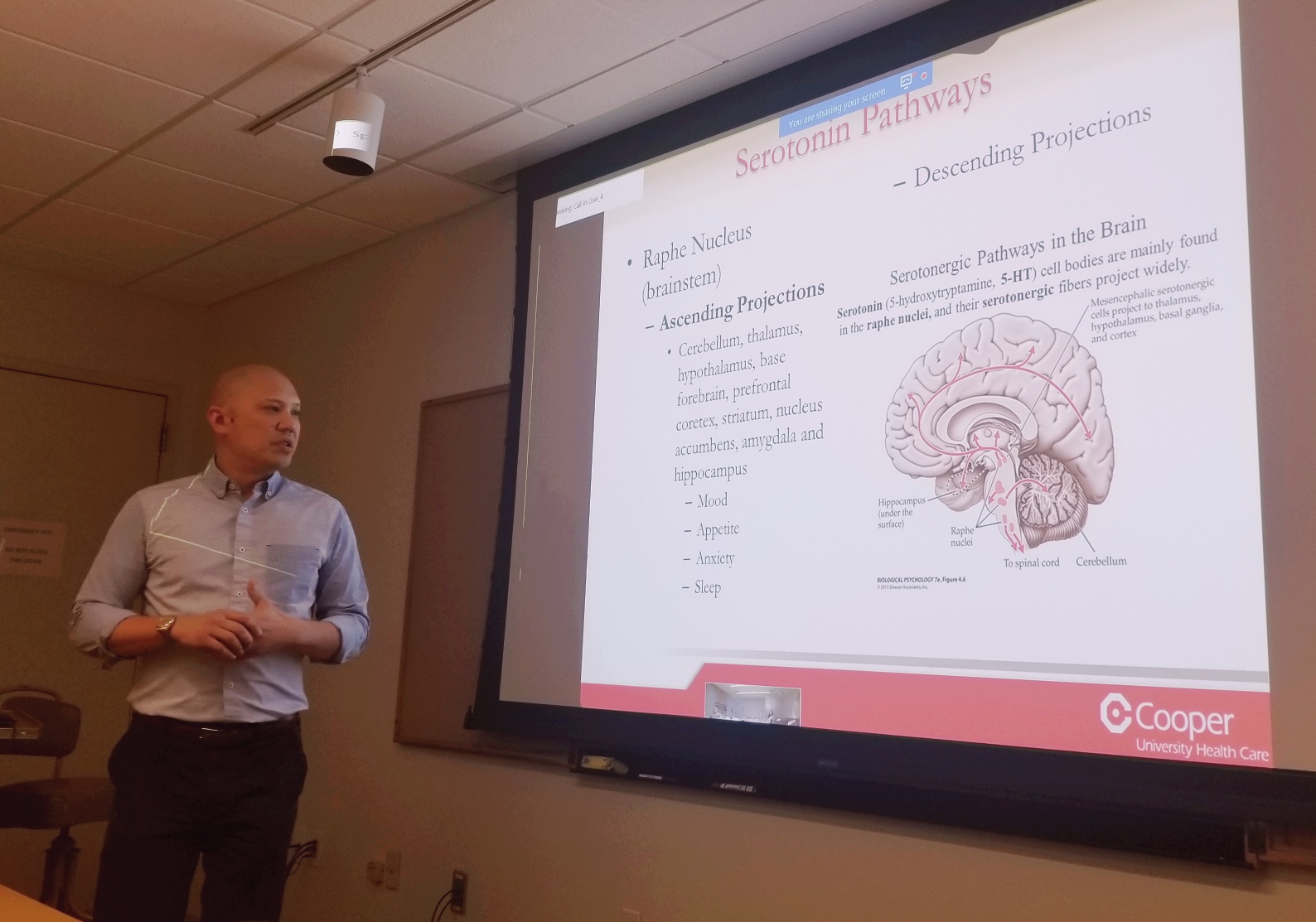Cooper Rotations
Inpatient Psychiatry
The Inpatient Adult Psychiatry Unit at Cooper University Health Care is a 14-bed voluntary unit that provides an atmosphere conducive to facilitating patient recovery. A therapeutic milieu that includes attending psychiatrists, psychiatric residents, nurses, psychologists, psychology students, and social work provides for optimum patient care in an inpatient setting. Care is coordinated with referring physicians, agencies, and therapists to maintain patient care in the surrounding community once the patient is discharged from the hospital.
The inpatient Unit provides residents with an invaluable experience in managing a variety of cases and patients from various ethnic and socioeconomic backgrounds. The rotation is structured to teach residents a comprehensive multidimensional approach to patient care that utilizes psychotherapy and pharmacotherapy.
The Cooper Psychiatry residency program has a partnership with Northbrook Behavioral Health Hospital in Blackwood, NJ. During their PGY-2 year, our residents rotate at Northbrook for involuntary inpatient psychiatry training.
Emergency Psychiatry
As part of the emergency psychiatry rotation, residents rotate through the emergency department at Cooper University Health Care. The design of this rotation provides residents the skills in assessing, diagnosing, and managing a wide variety of psychiatric emergencies.
Consultation & Liaison Psychiatry
Psychiatric consultation services for adult and pediatric/adolescent patients are provided at Cooper University Health Care to all departments including Trauma, Critical Care, Internal Medicine, Oncology, Endocrinology, General Surgery, Plastic Surgery, Neurology, Neurosurgery, Pediatrics, and Obstetrics and Gynecology. During this rotation, residents work closely with staff physicians and residents in various fields of medicine providing treatment recommendations to assist in the care of their patients from a psychiatric standpoint. The resident will also gain experience in Electroconvulsive treatment of patients in the outpatient and inpatient setting. Psychologists and psychology students also rotate alongside the psychiatrist and psychiatry residents in this service providing additional experience in a wide range of psychotherapeutic treatments.
Adult Outpatient Psychiatry
The outpatient experience at Cooper University is an important part of resident training. During this rotation, PGY-3 and PGY-4 residents work in several general and specialty clinics that provide the resident the opportunity to learn about and acquire skills encompassing different models of care that are employed today. Residents are required to carry at least 2 therapy cases per year and apply various psychotherapy models (e.g., CBT, psychodynamic, supportive, interpersonal, and trauma-focused psychotherapy.)
Child and Adolescent Psychiatry
PGY-3 residents are able to rotate in various outpatient settings and a residential treatment center. Residents have the opportunity to gain skills in interviewing children, adolescents, and families, as well as learn family therapy. They also gain experience in child psychopharmacotherapy. PGY-4 residents have the option of continuing this clinic as an elective.
Addiction Psychiatry, Geriatric Psychiatry and Forensic Psychiatry are integrated into the inpatient, consultation, and outpatient rotations. Electives concentrating in these areas are also available.
Internal Medicine
This is a four-month rotation required for board eligibility in psychiatry. The rotation typically includes experience on the hospitalist floor teaching service, as well as on the internal medicine consult service. If you are interested in Child & Adolescent, one of the four months can be done in pediatrics.
Neurology
This is a two-month rotation required for board eligibility in psychiatry. This rotation typically consists of experience on the two neurology consult services: general neurology and stroke.
Palliative Care
Palliative Medicine is designed to be integrated as part of a patient’s care plan at any time, to manage symptoms related to treatment such as chemotherapy, or for symptoms that linger or appear after treatment is complete. Residents rotate on the palliative care hospital consult service to identify patient’s goals and individualized care plan including facilitating end of life decisions. Learn more: Palliative Medicine | Cooper University Health Care (cooperhealth.org)
Electives
(Other electives are available, discuss with Program Director. Electives outside of NJ/DE need PD/RTC approval then GME/Legal approval.)
- Addiction Psychiatry
- Child & Adolescent Psychiatry
- Junior Attending on Adult General Inpatient Psychiatry
- Junior attending on Consultation and Liaison (Psychosomatic) Psychiatry
- Emergency Psychiatry
- Forensic Psychiatry
- Geriatric Psychiatry
- Community Psychiatry
- Research
- Neuromodulation rotation (ECT, TMS, esketamine)
- Administrative Psychiatry
- Sleep Medicine
- Pain
- Palliative Care
- College Mental Health
- Medical Informatics
- Integrative HIV clinic
- Eating Disorder Program
- Women’s Mental Health
- Private Practice
- Neuropsychiatry
- Outside of the state rotations which need special approval by GME

